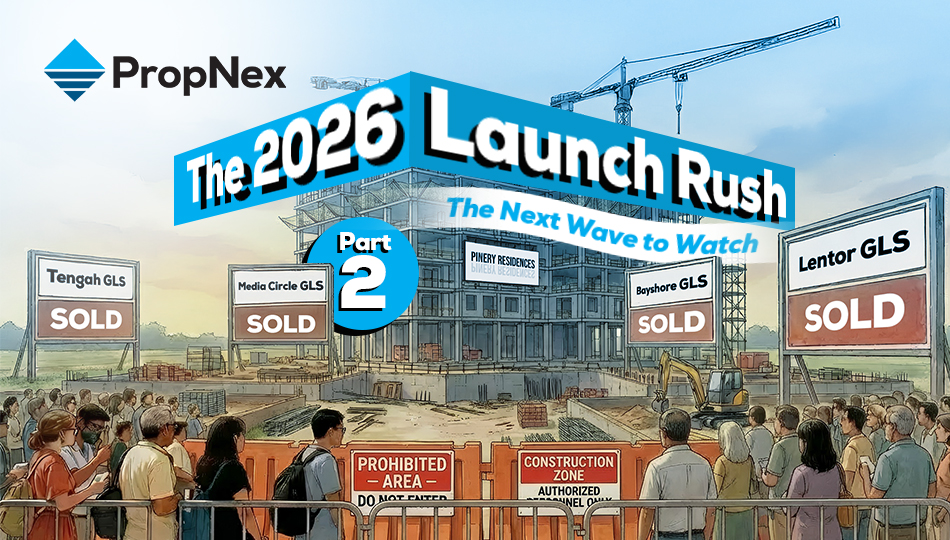To Hold Or Not To Hold? Will Holding Make Me More $$?????


Deciding whether to hold your property or sell it is one of the most significant financial choices a property owner can make. The question, "to hold or not to hold" captures the essence of this dilemma, particularly in a dynamic real estate market like Singapore's.
As of 2024, the Singapore resale property market shows signs of moderation but is far from slowing down dramatically. Resale prices will only continue to rise in 2025, reflecting a steady demand and market stability. While the growth rate has certainly slowed down compared to the pandemic boom years, the market activity remains robust with high transaction volumes, indicating an active, stable market rather than a declining one.
Whether you are thinking of selling or buying a property, it is near impossible to predict when the property value will rise to higher heights or hit an all-time low. Even with access to property transaction data, it is impossible to predict how the property market will react with time. However, they will show you the current direction that the resale market is heading towards, which to me, looks promising if you are looking to sell but worrying if you are looking to buy.
HDB Resale Transaction Trend (2014-2024)
Source: PropNex Investment Suite
We can see that the value of HDBs have increased over the past decade. Statistically speaking, the longer you hold your property, the better the property's value appreciation. No matter which region in Singapore your HDB is located at, whether CCR (Orange), RCR (Red), or OCR (Blue), you will profit by 18% to 36% if you have held your unit for the past decade.
Nevertheless, it is important to remember the new classifications of BTO flats and their required MOP. For standard flats, which can be found in most regions, there is a 5-year MOP. For plus and prime flats, which are normally found in RCR and CCR, respectively, there is a 10-year MOP. Many things can happen within that period, affecting your property value significantly.
Condo Resale Transaction Trend (2014-2024)
Source: PropNex Investment Suite
The value of private condos and apartments have also increased over the past decade, with many of the owners profiting by 23-51% should they have held it for the same time frame. With private properties, there are no MOP restrictions to selling it. You can sell it whenever you want to. However, there is the Seller Stamp Duty to curb property market speculation.
If you sell within:
- First year: 12% SSD
- Between first and second year: 8% SSD
- Between second and third year: 4% SSD
- After third year: No SSD
Nevertheless, if your property value has increased and you are able to make a profit, then you can transact whenever beneficial. All in all, instead of trying to predict how much the property value will continue to rise, it makes more sense to factor the current seller's market. However, this is best applied if you purchased your home as an investment property, allowing you to maximise as much gains as possible.
The property market is made up of two opposing sides: seller's and buyer's market.
A buyer's market occurs when there are more available properties than potential investors. When there is an influx of available properties in the market, homeowners can expect to see their properties listed on the market for an extended period before an offer is made. Additionally, there is an increased chance of them having to lower their asking price or accede to additional terms, such as early move-in and adjustment of timeline.
On the other hand, a seller's market occurs when there are more potential investors than available properties. As a result, homeowners are more likely and quicker to get several offers at once. They are also more likely to sell their properties at their asking price. This is due to the inflationary effect on the asking price as a result of human's competitive nature over "limited" stock. It forces investors to offer their best price in the hope to secure their dream home.
1. You might be able to sell at more than your asking price
Given that there is a low supply of properties and a high demand, you might potentially get more offers and viewings. Potential investors are more than likely to meet or even go beyond your asking price, allowing you to earn a better profit. On the other hand, if you sell during a buyer's market, there is a high supply of properties and low demand. As such, buyers may not be as motivated to meet your asking price.
2. You can unlock faster gains
Unless your property comes with unfavourable features, such as being on a low floor and being near the rubbish chute, there is a high possibility that you can make a quick sale if you list your property on the seller's market.
1. You are selling it for financial reasons
For example, you are selling your home and downgrading to a more affordable property due to financial difficulties. As such, you are not able to keep up with the mortgage. Or perhaps your current home is getting old and maintaining it just costs too much. As such, you are looking to buy a newer property. In such cases, you might want to sell your home as quickly as you can. It is not worth waiting for prices to rise further.
2. Lifestyle changes that calls for a change of living environment
For example, you are expecting another child and need the extra space. Or perhaps your children want their own room but your current home is not able to accommodate it. Or perhaps you are sick of running up and down the stairs. However, in order for you to afford a new property, you require the profits from selling your current home. In such a situation, it does not make sense to wait for the property value to increase further.
3. There is no significant increase in property value
This is more so if your property is an investment piece. If the property is located in an ideal location but the price has remained the same for many years, and the URA master plan does not indicate any possible redevelopments or upgrading plans, then you might want to sell it, channelling your funds to purchase a better-performing property. All things considered, you might want to factor how urgent the sale is to decide if you are able to afford timing the market and whether it would benefit you more or lead to drawbacks.
1. The possibility of upgrading
If you are thinking of upgrading from your HDB home to a private condo or apartment, it will be smart to sell your HDB while ensuring that you have sufficient to cover the remaining cost. Here is the property trend of private condos and apartments and HDBs.
Private condos and apartments vs HDBs
Source: PropNex Investment Suite
The blue line represents private condos and apartments while the red line represents HDBs. As you can see, the average psf of private properties are significantly higher than HDBs. Anything can change along the way. There is never a fixed trend in terms of the property market, as seen below in a recent article published in The Straits Times.
Holding your property for a longer time might not necessarily equate to "making more money". Instead, it could lead to an unwanted scenario. As such, rather than just waiting it out, it is best to ensure these two basic levels of "affordability":
- Being able to keep to a loan repayment of 4% of your combined income (bare minimum), best possible, 30%.
- Ensure you have adequate funds for your condo downpayment, which consists of a 20% Additional Buyer's Stamp Duty - ABSD (Singaporean), 30% ABSD (PR), 1-6% Buyer's Stamp Duty - BSD depending on the condo purchase price, and 5-10% cash downpayment.
If you are not able to afford these, it is a clear indication that it is not the best time to sell, whether the market conditions are ideal or not. Many forget that when they sell high, especially in a seller's market, they are going to buy high, too! As such, selling just because you have received a really sweet deal is not going to cut. You need to ensure that you can afford your next property comfortably.
2. Local market trends
When timing your property sale in Singapore, closely monitoring recent transactions is vital to help you gauge the current market value of your property. By examining price movements over the past couple of months, you can determine if the property values are trending upwards, which might signal an ideal time to sell. On the other hand, if the property values are dropping, you might want to hold for a more favourable market.
Supply and demand dynamics also play a significant role in determining the right time to sell your property. Keep an eye on new property launches in your area. The introduction of new developments can either boost demand due to increased interest in the area or increase supply which can apply downward pressure on prices. Additionally, consider ongoing or potential en bloc sales in your vicinity, as these can affect property values by driving up demand in the short term, as we can see in the article below.
Infrastructure developments are another key factor to consider. Proximity to major expressways, bus routes, and new MRT lines, can significantly enhance property values. For example, the opening of the Thomson-East Coast Line has boosted property prices along its route.
Government policies play a pivotal role in shaping the local property market. The Singapore government frequently implements cooling measures to regulate the property market, such as changes to ABSD, SSD, LTV limits, and HDB loan policies. Staying informed about current and potential future measures is essential, as they can significantly affect market dynamics. Additionally, changes in housing grants or subsidies for HDB flats, such as the Enhanced CPF Housing Grant, can influence demand.
At the end of the day, the decision to hold or sell your property ultimately depends on your unique circumstances and long-term goals. By carefully weighing the market conditions, financial situation, and potential returns, you can make an informed choice that aligns with your future aspirations.
Views expressed in this article belong to the writer(s) and do not reflect PropNex's position. No part of this content may be reproduced, distributed, transmitted, displayed, published, or broadcast in any form or by any means without the prior written consent of PropNex.
For permission to use, reproduce, or distribute any content, please contact the Corporate Communications department. PropNex reserves the right to modify or update this disclaimer at any time without prior notice.












